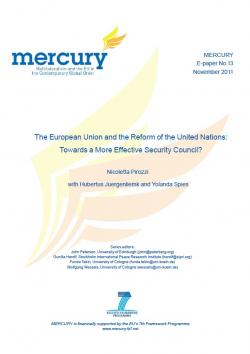The European Union and the Reform of the United Nations: Towards a More Effective Security Council?
This paper aims to assess the possible impact of the Lisbon Treaty on the EU’s presence and performance at the United Nations and outline the prospects for future developments under three main dimensions: coordination (among EU member states and institutions); representation (of the EU as a single actor); and impact (measured in terms of what the EU and its member states collectively achieve). In particular, these benchmarks are used to evaluate what influence the positions of the Union’s institutions and member states produce on the crucial issue of UN Security Council’s reform. Moreover, it offers an analysis of the EU’s cooperation with other regional entities, primarily the African Union, at the UN and provides a model for testing the possible role of regional organizations and the evolution of regionalism within the UN system.
Paper prepared within the framework of Mercury, a project funded by the Seventh Framework Programme of the European Union. Published in: Caroline Bouchard, John Peterson and Nathalie Tocci (eds.), Multilateralism in the 21st Century. Europe's Quest for Effectiveness, London and New York, Routledge, August 2013, p. 227-244, ISBN 978-0-415-52003-4; 978-0-415-52004-1 (pbk).
-
Details
Edinburgh, MICROCON - University of Edinburgh, November 2011, 32 p. (MERCURY E-paper ; 13)
Introduction
1. Globalism and Regionalism in the EU’s Commitment to Effective Multilateralism
2. How Much of the EU at the UN Security Council? Norms and Practice
3. The EU and the Reform of the UN Security Council
4. Overcoming Deadlock: the Role of Regional Organizations
Conclusion
References
Topic
Tag
Related content
-
Ricerca06/01/2014
MERCURY – Multilateralism and the European Union in the contemporary global order
leggi tutto -
Publication31/05/2013
Multilateralism in the 21st Century
leggi tutto



